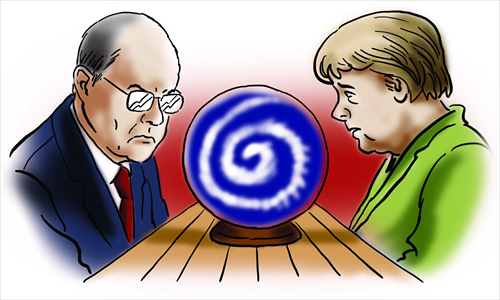German policy to stay the course after election

Illustration: Liu Rui/GT
International attention is focused on Germany these days. The elections this Sunday will determine who will be the chancellor to deal with pending challenges, in particular those at the European level.
All surveys clearly demonstrate that the conservative Christian Democratic Union party (CDU) of Chancellor Angela Merkel will win the elections. The party, however, will not be able to form a government alone. Therefore, three scenarios - with CDU as the central player - are currently being discussed.
The first scenario is based on the continuation of the present coalition government. This can happen if the liberal Free Democratic Party (FDP) passes the required threshold of 5 percent and enters parliament. For the time being, predictions are highly risky because polls suggest that it vacillates between 4 percent and 6 percent.
The second scenario is grounded on a so-called "grand coalition" where the CDU will form a coalition government with the Social Democrat Party (SPD). Such a development would not be new for modern German politics. The country applied this model from 2005 until 2009.
Finally, the third scenario involves political cooperation between the Conservatives and Greens. Although the Green Party has ruled out this possibility, experience from politics suggests that there will be caution and patience in deliberations after the election result is announced.
It is also worth mentioning that some policymakers from the CDU do not view a potential coalition with the Greens as a bad option, as this would give a new dimension to Merkel's third consecutive term.
Irrespective of the final form of the new German government, Berlin's policies won't significantly change.
As far as domestic developments are concerned, the economic model applied in the country in previous years has been successful.
Data, statistics and research reports demonstrate the decreases in unemployment, the increases in competitiveness, the emphasis on innovation and business and the selection of Germany as a top destination for young people seeking jobs. Problems such as income disparities cannot be ignored, but only partly influence the general attitude of public opinion which remains positive and optimistic about the future.
In line with this, a majority of German citizens have a lot of trust for Merkel and consider her a reliable, competent and honest leader who has managed to safely guide the country amid the most important world financial crisis since the Great Depression.
In regard to the EU, Berlin will need to make important decisions regarding economic governance after this Sunday. But it remains uncertain whether it will proceed with radical steps such as the issue of eurobonds and debt-mutualization, in line with proposals from most European studies scholars.
In that regard, along with constitutional constraints, hurdles are also imposed by the rigid stance of public opinion. According to a poll by the economic newspaper Handelsblatt, 71 percent of German respondents support the continuation of austerity policies in southern Europe while only 25 percent disagree with this stance. In addition, a YouGov survey shows that 52 percent of Germans oppose additional loans to problematic eurozone countries like Greece.
In the aftermath of the federal elections Germany will act as an economic colossus not only in the EU but also internationally.
In doing so, it will not hesitate to undertake important initiatives in world politics. Examples include further improving bilateral relations with China and openly challenging the US via disagreements over issues such as the military intervention in Syria, the protection of citizen's personal data and the approval of stimulus packages to kick off the economy.
Nevertheless, the main focus of Berlin cannot move away from the Old Continent. Political and social developments in southern states might - in the coming months - derail its plans for a smooth transition into a German Europe.
The impacts of recession, unemployment and poverty will possibly lead to new rounds of aggressive reactions threatening the stability of national governments as well as social cohesion. Although European policymakers are attempting to persuade the public that the worst part of the debt crisis belongs to the past, this view is rather rose-tinted.
As long as the real economy remains frozen, lacking liquidity, the situation will deteriorate. The new chancellor of Germany will be under pressure to show flexibility, avoid parochial policies, and assume political leadership in order to prevent chaos.
The author is a research fellow at the Hellenic Foundation for European and Foreign Policy. opinion@globaltimes.com.cn